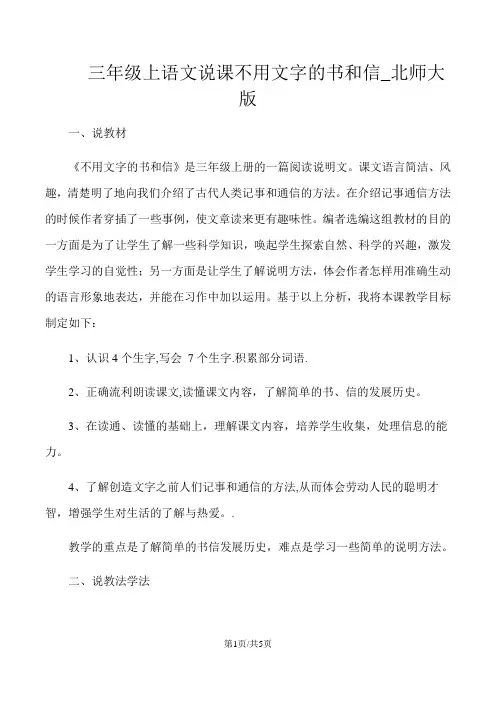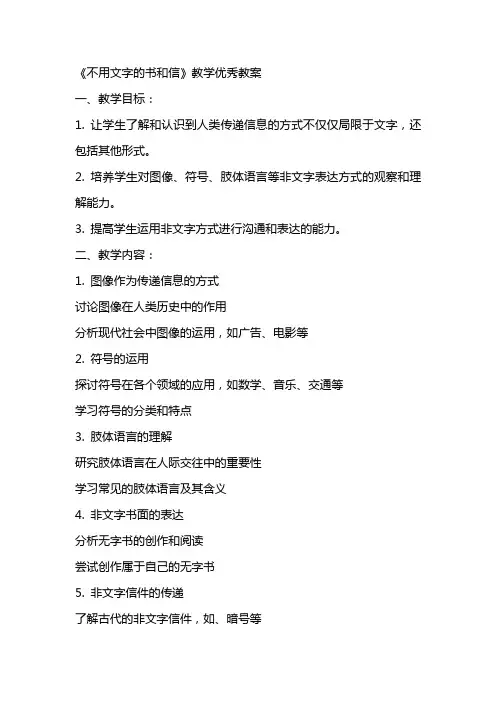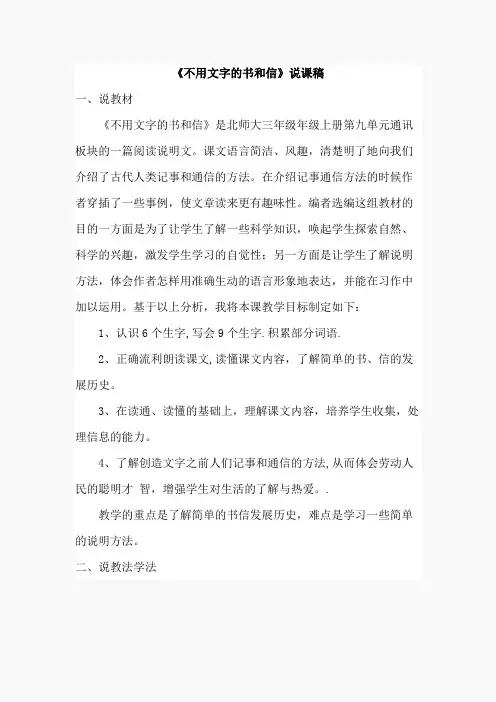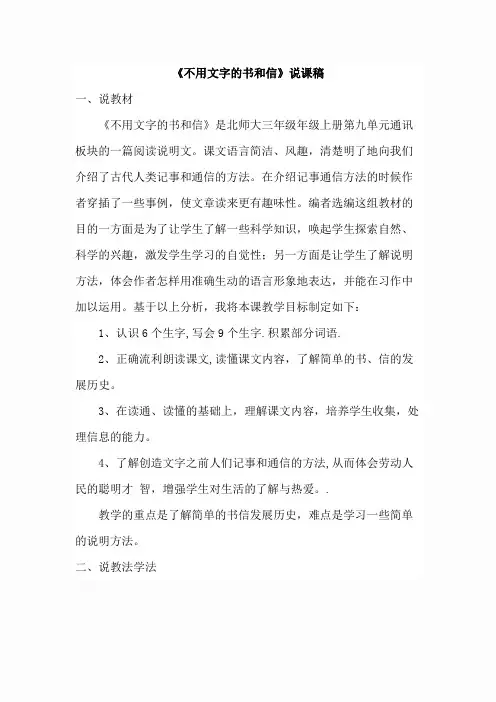《不用文字的书和信》课文内容讲解
- 格式:ppt
- 大小:60.50 KB
- 文档页数:1

三年级上语文说课不用文字的书和信_北师大版一、说教材《不用文字的书和信》是三年级上册的一篇阅读说明文。
课文语言简洁、风趣,清楚明了地向我们介绍了古代人类记事和通信的方法。
在介绍记事通信方法的时候作者穿插了一些事例,使文章读来更有趣味性。
编者选编这组教材的目的一方面是为了让学生了解一些科学知识,唤起学生探索自然、科学的兴趣,激发学生学习的自觉性;另一方面是让学生了解说明方法,体会作者怎样用准确生动的语言形象地表达,并能在习作中加以运用。
基于以上分析,我将本课教学目标制定如下:1、认识4个生字,写会7个生字.积累部分词语.2、正确流利朗读课文,读懂课文内容,了解简单的书、信的发展历史。
3、在读通、读懂的基础上,理解课文内容,培养学生收集,处理信息的能力。
4、了解创造文字之前人们记事和通信的方法,从而体会劳动人民的聪明才智,增强学生对生活的了解与热爱。
.教学的重点是了解简单的书信发展历史,难点是学习一些简单的说明方法。
二、说教法学法倡导自主、合作、探究的学习方式,借助多媒体手段和情景的巧妙设置来激活课堂的教学气氛。
比如:采用情境教学、快速默读、合作探究、对比教学等方法进行教学。
三、说教学程序为了解决教学重点,突破难点,顺利达成教学目标,我把本谭的教学程序设计为以下四个环节:(一)谈话激趣,揭示课题上课伊始,我便问学生:瞧!老师手里拿的是什么?待学生回答是“一本书”和“一封信”时,我及时把“书”和“信”两字板书在黑板上。
继而又问题:“书和信”里都写满什么?当学生回答“文字”时,我又在“书”和“信”字前补充板书“文字”。
然后引导学生说:人类在没有创造文字之前,人们是如何来记事的?又是如何来通信的?这就是我们今天本节课要探讨的问题--“不用文字和书和信”。
这里,我将用红笔在黑板上着重补充“不用”二字,使课题完整。
最后让学生齐读课题两遍,对课题进行质疑。
有的学生马上就会心生疑问:“什么书不用文字呢?没有文字的信该如何阅读呢?……”如此设计符合五年级学生的心理特征,好奇心强,求知欲望,对新鲜事物开始思考追求和探索。

《不用文字的书和信》教学优秀教案一、教学目标:1. 让学生了解和认识到人类传递信息的方式不仅仅局限于文字,还包括其他形式。
2. 培养学生对图像、符号、肢体语言等非文字表达方式的观察和理解能力。
3. 提高学生运用非文字方式进行沟通和表达的能力。
二、教学内容:1. 图像作为传递信息的方式讨论图像在人类历史中的作用分析现代社会中图像的运用,如广告、电影等2. 符号的运用探讨符号在各个领域的应用,如数学、音乐、交通等学习符号的分类和特点3. 肢体语言的理解研究肢体语言在人际交往中的重要性学习常见的肢体语言及其含义4. 非文字书面的表达分析无字书的创作和阅读尝试创作属于自己的无字书5. 非文字信件的传递了解古代的非文字信件,如、暗号等学习编制简单的非文字信件三、教学重点与难点:重点:让学生认识到非文字表达方式的存在及其重要性,培养学生运用非文字方式进行沟通和表达的能力。
难点:对非文字表达方式的理解和运用,特别是肢体语言的解读和无字书的创作。
四、教学方法:1. 讲授法:讲解图像、符号、肢体语言等非文字表达方式的特点和应用。
2. 案例分析法:通过分析具体案例,让学生了解非文字表达方式的实际运用。
3. 实践活动法:让学生亲自动手尝试创作无字书和编制非文字信件,提高实际操作能力。
4. 小组讨论法:鼓励学生分组讨论,分享对非文字表达方式的理解和感悟。
五、教学准备:1. 教材:《不用文字的书和信》相关教学内容。
2. 课件:准备与教学内容相关的图像、符号、肢体语言等案例。
3. 教学工具:白板、投影仪、笔记本电脑等。
4. 实践材料:纸张、彩笔、剪刀、胶水等。
教学评价:通过学生在课堂上的参与度、实践活动成果以及课后作业,评估学生对非文字表达方式的理解和运用能力。
六、教学过程:1. 导入:以一幅图片或一个简短的动画引入主题,激发学生对非文字表达方式的好奇心。
2. 讲授:讲解图像、符号、肢体语言等非文字表达方式的特点和应用,举例说明其在日常生活中的重要性。



《不用文字的书和信》说课稿一、说教材《不用文字的书和信》是北师大三年级年级上册第九单元通讯板块的一篇阅读说明文。
课文语言简洁、风趣,清楚明了地向我们介绍了古代人类记事和通信的方法。
在介绍记事通信方法的时候作者穿插了一些事例,使文章读来更有趣味性。
编者选编这组教材的目的一方面是为了让学生了解一些科学知识,唤起学生探索自然、科学的兴趣,激发学生学习的自觉性;另一方面是让学生了解说明方法,体会作者怎样用准确生动的语言形象地表达,并能在习作中加以运用。
基于以上分析,我将本课教学目标制定如下:1、认识6个生字,写会9个生字.积累部分词语.2、正确流利朗读课文,读懂课文内容,了解简单的书、信的发展历史。
3、在读通、读懂的基础上,理解课文内容,培养学生收集,处理信息的能力。
4、了解创造文字之前人们记事和通信的方法,从而体会劳动人民的聪明才智,增强学生对生活的了解与热爱。
.教学的重点是了解简单的书信发展历史,难点是学习一些简单的说明方法。
二、说教法学法倡导自主、合作、探究的学习方式,借助多媒体手段和情景的巧妙设置来激活课堂的教学气氛。
比如:采用情境教学、快速默读、合作探究、对比教学等方法进行教学。
三、说教学程序为了解决教学重点,突破难点,顺利达成教学目标,我把本谭的教学程序设计为以下四个环节:(一)谈话激趣,揭示课题上课伊始,我便问学生:瞧!老师手里拿的是什么?待学生回答是“一本书”和“一封信”时,我及时把“书”和“信”两字板书在黑板上。
继而又问题:“书和信”里都写满什么?当学生回答“文字”时,我又在“书”和“信”字前补充板书“文字”。
然后引导学生说:人类在没有创造文字之前,人们是如何来记事的?又是如何来通信的?这就是我们今天本节课要探讨的问题“不用文字和书和信”。
这里,我将用红笔在黑板上着重补充“不用”二字,使课题完整。
最后让学生齐读课题两遍,对课题进行质疑。
有的学生马上就会心生疑问:“什么书不用文字呢?没有文字的信该如何阅读呢?……”如此设计符合五年级学生的心理特征,好奇心强,求知欲望,对新鲜事物开始思考追求和探索。


《不用文字的书和信》说课稿一、说教材《不用文字的书和信》是北师大三年级年级上册第九单元通讯板块的一篇阅读说明文。
课文语言简洁、风趣,清楚明了地向我们介绍了古代人类记事和通信的方法。
在介绍记事通信方法的时候作者穿插了一些事例,使文章读来更有趣味性。
编者选编这组教材的目的一方面是为了让学生了解一些科学知识,唤起学生探索自然、科学的兴趣,激发学生学习的自觉性;另一方面是让学生了解说明方法,体会作者怎样用准确生动的语言形象地表达,并能在习作中加以运用。
基于以上分析,我将本课教学目标制定如下:1、认识6个生字,写会9个生字.积累部分词语.2、正确流利朗读课文,读懂课文内容,了解简单的书、信的发展历史。
3、在读通、读懂的基础上,理解课文内容,培养学生收集,处理信息的能力。
4、了解创造文字之前人们记事和通信的方法,从而体会劳动人民的聪明才智,增强学生对生活的了解与热爱。
.教学的重点是了解简单的书信发展历史,难点是学习一些简单的说明方法。
二、说教法学法倡导自主、合作、探究的学习方式,借助多媒体手段和情景的巧妙设置来激活课堂的教学气氛。
比如:采用情境教学、快速默读、合作探究、对比教学等方法进行教学。
三、说教学程序为了解决教学重点,突破难点,顺利达成教学目标,我把本谭的教学程序设计为以下四个环节:(一)谈话激趣,揭示课题上课伊始,我便问学生:瞧!老师手里拿的是什么?待学生回答是“一本书”和“一封信”时,我及时把“书”和“信”两字板书在黑板上。
继而又问题:“书和信”里都写满什么?当学生回答“文字”时,我又在“书”和“信”字前补充板书“文字”。
然后引导学生说:人类在没有创造文字之前,人们是如何来记事的?又是如何来通信的?这就是我们今天本节课要探讨的问题“不用文字和书和信”。
这里,我将用红笔在黑板上着重补充“不用”二字,使课题完整。
最后让学生齐读课题两遍,对课题进行质疑。
有的学生马上就会心生疑问:“什么书不用文字呢?没有文字的信该如何阅读呢?……”如此设计符合五年级学生的心理特征,好奇心强,求知欲望,对新鲜事物开始思考追求和探索。